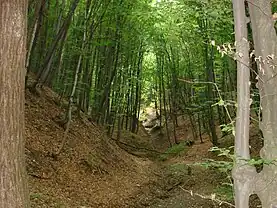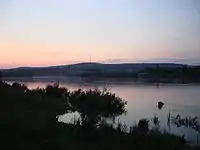Limba noastră
"Limba noastră" ("Our Language"; Romanian pronunciation: [ˈlimba ˈno̯astrə] ⓘ) is the national anthem of Moldova. It has been used since 1994 and was officially adopted on 22 July 1995.[1]
| English: "Our Language" | |
|---|---|
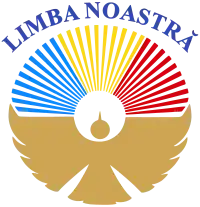 Emblem of Limba noastră | |
National anthem of Moldova | |
| Lyrics | Alexei Mateevici, 1917 |
| Music | Alexandru Cristea, ext. 1942 |
| Adopted | 1994 (unofficial) 1995 |
| Preceded by | "Deșteaptă-te, române!" |
| Audio sample | |
U.S. Navy Band instrumental version (three verses)
| |
| National anthems of Moldova | ||||||||||
|---|---|---|---|---|---|---|---|---|---|---|
|
||||||||||
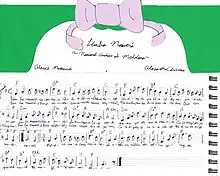
For a short period of time in the early 1990s, the national anthem of Moldova was "Deșteaptă-te, române!", which was and remains the national anthem of Romania. The lyrics were written by Alexei Mateevici (1888–1917) a month before his death.[2] Mateevici contributed significantly to the national emancipation of Bessarabia. The music was composed by Alexandru Cristea.
Lyrics
The focus of "Limba noastră" is language; in this case, the national language of Moldova, which is referred to as either Romanian[3] or Moldovan.[lower-alpha 1] It calls for the people to revive the usage of their native language. The poem does not refer to the language by name; it is poetically called "our language".
"Limba noastră" is based on a twelve-verse poem. For the officially-defined national anthem used today, the verses were selected and reorganised into five verses of four lines each; namely, the first, second, fifth, ninth and twelfth verses, respectively,[5] which are highlighted in bold.
| Romanian original[6][7] | Moldovan Cyrillic[8] (official in Transnistria) |
IPA transcription[lower-alpha 2] | English translation[9][lower-alpha 3] |
|---|---|---|---|
I |
I |
1 |
I |
Images
 Moldovan stamp depicting a Romanian language class. The teacher is explaining the lesson. On the blackboard is written a quatrain from "Limba noastră".
Moldovan stamp depicting a Romanian language class. The teacher is explaining the lesson. On the blackboard is written a quatrain from "Limba noastră". Moldovan stamp bearing the first verses of the anthem.
Moldovan stamp bearing the first verses of the anthem.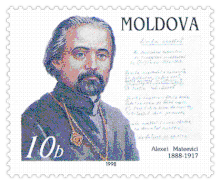 Mateevici, author of the poem. In the background are written quatrains from "Limba noastră".
Mateevici, author of the poem. In the background are written quatrains from "Limba noastră".
See also
- "Deșteaptă-te, române!", national anthem of Romania
- "Dimãndarea pãrinteascã", ethnic anthem of the Aromanians
- Moldovenism
Notes
- The constitution of the Republic of Moldova refers to the country's language as Moldovan, whilst the 1991 Declaration of Independence names the official language Romanian. In December 2013, a decision of the Constitutional Court of Moldova ruled that the Declaration of Independence takes precedence over the Constitution and that the state language is therefore Romanian.[4]
- See Help:IPA/Romanian and Romanian phonology.
- Source is only for the official verses.
References
- "20 de ani fără "Deșteaptă-te, române!"". Adevărul. June 2014.
- "De Ziua Limbii Române, "Limba noastră" va răsuna din turnul Primăriei Cluj". Ziua de Cluj. 30 August 2017. Retrieved 3 December 2020.
- "Poezia "Limba noastră", de Alexei Mateevici, a împlinit un secol". 10tv.md. June 2017.
- "Moldovan court rules official language is 'Romanian,' replacing Soviet-flavored 'Moldovan'"
- "The State Anthem of the Republic of Moldova". Presidency of the Republic of Moldova. Retrieved 30 April 2022.
- "Limba noastră". Poezie. 21 February 2010. Retrieved 23 August 2019.
- "Limba noastră". Versuri si Creatii. Archived from the original on 5 September 2019. Retrieved 7 February 2022.
- "Лимба матернэ — флоаре етернэ". Лимба молдовеняскэ (in Romanian). 24 April 2015. Retrieved 23 August 2019.
- Minahan, James B. (23 December 2009). The Complete Guide to National Symbols and Emblems [2 volumes]. ABC-CLIO. pp. 468–469. ISBN 978-0-313-34497-8.
External links
- Wikisource, "Limba noastră", full text of Mateevici's poem (in Romanian)
- State Symbols of the Republic of Moldova – The official page of the Republic of Moldova features a page about the flag and anthem, which include vocal and instrumental versions
- President's House – The official website of the President of Moldova has a page with information about the anthem. The Romanian version of the page also contains the music score of the anthem.
- Moldova: Limba noastră – Audio of the national anthem of Moldova, with information and lyrics (archive link)
- "Romanian Nationalism in the Republic of Moldova" by Andrei Panici, American University in Bulgaria, 2002
